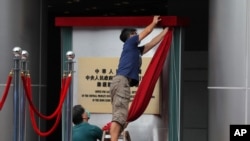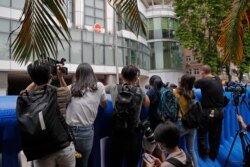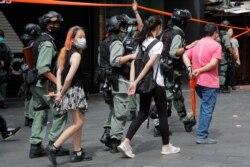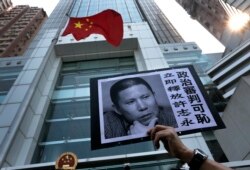Thursday marks the anniversary of the start of a sweeping purge involving more than 300 rights lawyers and activists in China that began on July 9, 2015. The ongoing sweep known as the 709 Crackdown is named for the date.
Prominent Chinese lawyers at home and abroad, who had been incarcerated or persecuted, told an online commemorative forum late Tuesday that the rule of law in China has continued to decline under the repressive rule of Chinese leader Xi Jinping.
Some said that many laws in China, including the Constitution, which guarantees freedom of speech and basic legal rights, have been cast aside when they conflict with the Chinese Communist Party’s (CCP) interests.
Others expressed concern that their peers in Hong Kong may soon encounter a similar crackdown as China tightens its grip on the former British colony by extending its draconian rule by law there.
‘Knife to kill’
“The law works as a tool for China to govern…that is, its knife to kill or leather rope to whip, so to speak,” Chinese rights lawyer Chen Jiangang, who fled to the United States last year due to China’s political persecution, told the online forum.
“Chinese authorities are not subject to the law, which provides no protection to the ruled or the oppressed,” he added, referring to both the practice of law in China and a new security measure in Hong Kong. The security law, which went into effect about a week ago, criminalizes open protest. It was a response to the massive and often violent protests in the city last year. Hong Kong Chief Executive Carrie Lam says the security law would help restore the city’s status as one of the safest in the world.
China has also opened a national security office in Hong Kong.
According to Chen, China’s legal abuse is widespread, ranging from forced confession and house arrest to the use of torture and secret trials.
For example, in recent months, relatives of COVID-19 victims in China have been explicitly barred from taking legal action against local governments or seeking national compensation. COVID-19 is the disease caused by the coronavirus. Meanwhile, it has become a practice for the Chinese government to appoint lawyers for the accused, who are essentially deprived of rights to legal counsel of their own choice – signs that Chen said showed the legal environment in China has gone from bad to worse.
Double strangle
Separately, lawyers who helped defend victims of the crackdown were also implicated with some being put behind bars and others having their licenses revoked – a move Chen described as a “double strangle” of lawyers by the Chinese authorities.
Sharing their experiences, rights lawyers who remain in China also paint a bleak picture of what they call the “dark age” in China’s legal history.
Yu Pinjian, a lawyer who defended Wang Quanzhang – the last victim of the crackdown, told the forum that the pace of China’s democratization has slowed considerably.
Yu said his license has been arbitrarily revoked and most of his social media accounts suspended to keep him from speaking up.
Wen Donghai, who defended Wang Yu – the first victim of the crackdown, said that civil society in China has underestimated Xi’s capacity to suppress anyone critical of him.
Wen urged his fellow lawyers to stay united under Beijing’s rule while Wang Yu urged international society not to be desensitized amid a growing list of lawyers being arrested in China.
Crackdown in Hong Kong
Chen, moreover, expressed concerns that China is now empowered by law to extend what he calls “its reign of terror” to Hong Kong – an observation that many rights activists and legal experts in Hong Kong agreed about.
“Under the CCP’s despotic rule, the sweeping arrests [of Chinese lawyers] since 2015 have never ceased to exist. And now a Hong Kong version of the 709 Crackdown is likely to emerge in the nearest future,” Albert Ho, chairman of Hong Kong-based China Human Rights Lawyers Concern Group, told the forum.
Ho is among the 15 pro-democracy activists, whom the Hong Kong government accuses of organizing, taking part in or publicizing unauthorized assemblies during the mass protests ast year.
While paying tribute to his Chinese peers for their efforts to seek justice, Ho said he foresees a similar fate or jail term for himself.
But Ho pledged to never give up his calls on Beijing to redress its wrongs in crushing the June 4th student-led movement in 1989 or end its one-party rule. On that day, Chinese government troops moved in to crush a demonstration that had been growing on Beijing's Tiananmen Square. Human rights groups believe several hundred to several thousand people were killed when tanks rolled through the square to quash the protest. Mainland China strictly bans commemorations of the event.
During the forum, international rights groups called on governments of the world to probe into China's continued purge of lawyers.
Continued purge
According to Human Rights Watch China, a handful of Chinese rights activists and legal academics, including Xu Zhiyong and Xu Zhangrun, have been rounded up after respectively asking Xi to step down and being critical of his governance.
To mark the human rights lawyer’s day, the forum organizer presented this year’s Chinese Human Rights Lawyer Award to Xu Zhiyong, founder of the social campaign New Citizens Movement, who was arrested in mid-February in Guangzhou, southern China, after criticizing Xi for mishandling the coronavirus crisis.
And this year’s first-ever China Rule of Law and Human Rights Award was granted to Jerome Cohen, a law professor at New York University, for his contributions to China’s human rights activism.








